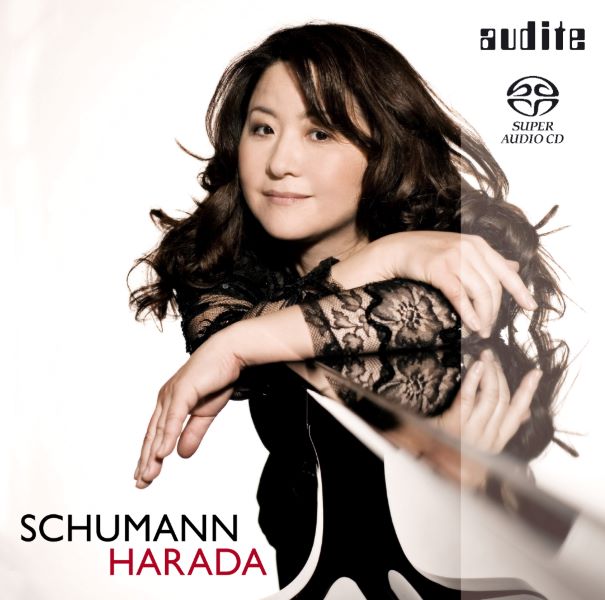
release date: April 1, 2010




International Piano
Hideyo Harada trained in her native Japan, as well as in Europe and, latterly, at the Moscow Conservatory with the venerable Victor Merzhanov. This third release for Audite reveals her as an engaging artist. Throughout, her carefully detailed fingerwork and pedalling bring clarity within the rich textures, and although she responds well to the introspective moments of the Fantasie – especially in an unusually serene final movement, which becomes something of a delicious reverie – she is more than equal to the work's blustery, testosterone-driven passion. The fact that her expressive force seems entirely driven from within makes for a highly meaningful account. Her Kreisleriana displays the same combination of athleticism and poetry. An increasingly transparent and deftly spun middle section in no.3, 'sehr aufgeregt', emerges into a fiery climax, amply underlining the wide mood-swings of Johannes Kreisler – the unstable, borderline-genius music-master of E.T.A. Hoffmann's creation, on whom Schumann based this set of fantasias. ( July/August 2010 )
www.allmusic.com
Audite's super audio CD release Schumann: Fantasia; Kreisleriana; Arabeske made its bow as the classical music world observed the 200th anniversary of Robert Schumann's birth amidst a veritable flood of Schumann solo piano recordings in the market. This, of course, adds to the already established surfeit of acknowledged classics by long ago keyboard masters such as Artur Rubinstein and Vladimir Horowitz and newer, less idiosyncratic — and highly recommendable — offerings by Murray Perahia, Alfred Brendel, Mikhail Pletnev, Evgeny Kissin, and so on. Japanese pianist Hideyo Harada concentrates her concert career mainly in Germany and her native Japan; however, her previous Audite recording of Tchaikovsky and Rachmaninov has gained high marks among critics in the English-speaking world, so perhaps her entry in the Schumann sweepstakes stands a chance.
Whether Harada hits the jackpot or not in such a crowded field, this recording of Schumann's Fantasia in C, Op. 17, and Kreisleriana, Op. 16, is not one to miss. The sound is quite good; there's some noticeable compression to the recording, but not so much that it's distracting, and the piano's sound tends toward the dark hues, though it does not fail to provide a sense of warmth. One of the aspects that made Rubinstein's old RCA Victor recordings of these works so enduring was the closeness of the recording itself; it was so right up on Rubinstein that you could almost hear the sound of a depressed key hitting the felt below, and the feeling of immediacy and intimacy that resulted was palpable. Here, Harada manages to convey much the same impression, but with the piano sound being placed not quite so close; bass sonorities ring out, and higher passagework sparkles with a certain kind of special, gracious lilt. This is especially apparent in the Kreisleriana, which is given a great, carefully modulated and memorable performance here; reflective passages are given a patient, hushed reading, whereas stormier ones are dazzlingly virtuosic, though Harada never loses control. Harada also manages to worm in the Arabeske, Op. 18, in addition to the usual pairing of the Fantaisie in C and Kreisleriana, usually enough to fill a disc on their own. Overall, Audite's Schumann: Fantasia; Kreisleriana; Arabeske is an excellent choice for these standard works whether one is coming to them for the first time or has sipped at this particular fount for many a season. ( June 2010 )
www.audad.com
Japanese pianist Hideyo Harada is a pupil of Hans Kann and Viktor Merzhanov, and she enters this fine disc as part of the ongoing Schumann bi-centennial celebration of his birth. Recorded 16-18 June 2008 at the Jesus-Christus-Kirche, Berlin-Dahlem, Ms. Harada plays a resonant Steinway D, which enjoys a solid middle and lovely upper registers. Harada approaches the great 1836 C Major Fantasie as a pastiche in moods and colors, albeit derived from certain references to Beethoven's Op. 98 song-cycle, "An die ferne Geliebte," which Schumann employs anagrammatically to refer to his own beloved Clara Schumann. The music's first movement, fluctuating between huge arpeggiated sequences and hymnal chord progressions, breaks off into a literary mode he calls a "legend," that becomes fragmented, even uttering Perpetuum mobile elements and figures from his own Papillons. Several motifs seem derived from Beethoven's famous "Moonlight" Sonata, which return in the last movement. Harada has her hands full, certainly, to balance the eclectic and mercurial pastiche this music can become, and she seems intent to project as much of an arch-form as possible, always sensitive to her tone and color palette. Schumann himself held the second movement dearest to this own heart, a kind of triumphal march in the spirit of Beethoven that offsets the feverish melancholy of the first movement. The syncopations and agogics can fluster some pianists, but Harada relishes the both the tempests and the poetic oases the movement proffers, saving the bravura for the last pages, which quite demand it. What Harada projects in the last movement, a grand adagio, is a luminous serenity, an emotional resolution not necessarily heroic but radiant in its aesthetic pose. The 1838 suite Kreisleriana marks a willful departure into the virtuoso repertory, an attempt to convert E.T.A. Hoffmann's mythical, Faust-like Johannes Kreisler into a pattern of alter-egos in music similar to Schumann's own dichotomy of Florestan and Eusebius. The eight-movement suite gravitates between D Minor and G Minor, with frequent excursions into B-flat Major. The exception comes in the seventh episode, marked Sehr rasch and cast in C Minor and E-flat Major, the outer sections much in the spirit of Beethoven. Passionate, dreamy, impulsive, occasionally splenetic, the pieces move through storms and stresses to find cantabile moments of devout serenity. Songlike simplicity alternates with "learned" procedures, especially fugal writing in the manner of Schumann's revered J.S. Bach, again in piece No. 7. The G Minor finale, "Fast and Playful," contains tripping seeds for Schumann's Spring Symphony finale. Again, Harada exploits her capacity to make tone, as in the third movement, Sehr aufgeregt (quite agitated), a G Minor nocturne in the elastic spirit of Chopin but marked by Schumann's own melancholy idiom. (Movement six offers another Nocturne in B-flat Major, but its style of upward scales seems archaic and emotionally intricate, yet close to the Chopin Op. 37.) The galloping figure that occupies the outer sections projects a teasing yet frenzied passion, a series of broken chords that threaten to sweep us away. Innigkeit - Schumann's call for inwardness - manifests itself in sections three and four, the harmonies gravitating to places well beyond classical constraints. The arabesques of number five, Scherzando in G Minor, project a mercurial, manic side of Schumann's personality, exploding into cascades of sound Debussy would find attractive. Harada's sensitivity to Schumann's ritardandi and agogic accents - he employs twelve hemiolas or metric shifts in No. 5 - makes her performance a keeper, especially given the lucidity of her piano tone, courtesy of engineer Ludger Boeckenhoff, and the SACD's clarity. The famous 1838 Arabeske in C drips with nostalgia, set as an ostinato and melody in continuous dialogue in five sections and an epilogue. Harada plays the piece as a song without words, mercurial, evasive, occasionally melancholy and reflective, as the Minore sections converse and interact, confident in their poetic and physical reconciliation, as Schumann must have dreamt his longing for his beloved Clara Wieck. ( July 14, 2010 )
Fono Forum
No matter how many new recordings the current Schumann year may yet bring: this third Audite production with Hideyo Harada will doubtless be remembered as a highpoint. Very few recordings unite all of the ingredients required for the proverbial ‘deserted island CD’ in such an appealing, even breathtaking way: flawless fidelity to the musical text, outstanding pianism, interpretive eloquence. And all conveyed by very good, naturally brilliant state-of-the-art sound… ( June 2010 )
Pizzicato
It has been a long time since this work has been heard in such a beautiful, flowing, breathtaking, intense performance. ... A must, especially since the SACD recording technology is as convincing and clear as the performance itself. ( June 2010 )
BR-Klassik
… With impressive musical and pianistic confidence, Hideyo Harada gives expression to the multilayered dialectic of Schumann’s pianistic poetry, with its contrasts of tenderness and turbulence. Consistently, her notably inward, sensitive, but by no means bloodless elucidation of Schumann’s intricate moods takes the form of an ebullient, organic flow. For all of her sensitivity to fine contrasts, the Japanese pianist also succeeds in infusing this music with an electrifying larger emotional dramaturgy. On the whole, a thoroughly recommendable recording, for the brilliant and at the same time highly natural SACD sound quality as well. Even for those who already own recordings of the Fantasy in C Major, the Kreisleriana, or the Arabeske op. 18 – all highly popular Schumann masterworks. ( June 24, 2010 )
Stereo
A marvelously enlightening account. ( July 2010 )
Rondo
Three years ago, Hideyo Harada was acclaimed for her wonderful homage to Grieg. Now, the Japanese pianist pays tribute to Robert Schumann. More and more with repeated hearings of Harada’s interpretation of the Fantasy op. 17, its intimate details and poetic subtleties cast a spell over the listener. This CD is a genuine treasure. ( April 1, 2010 )
Crescendo
The heart of her new Schumann CD is a spirited account of Kreisleriana op. 16 that is characterized by depth of feeling, and when required, iron technical control as well. The ethereal conclusion of her Arabeske op. 18 is simply out of this world – and leaves the listener eager to learn more about this pianist. ( June 2010 )
Piano News
All in all, a marvelously successful recording. ( May 2010 )
Westdeutsche Allgemeine Zeitung
Flashes of Inspiration Defy Piano Thunder:
CD recordings by Arcadi Volodos, Boris Berezovsky, and Hideyo Harada make one yearn for Piano Summer.
… In detail, Hideyo Haradas playing is perceptibly suffused with the spirit of the Romantics, and sustained by the courage to maintain her own perspective. ( April 1, 2010 )
Ruhr Nachrichten
Romanticism is this pianist’s domain ... With her Schumann interpretation, she sets standards. With Kreisleriana in particular. In this inner drama, which revolves around the Kapellmeister Kreisler, she strikes just the right Schumannesque tone. Harada’s playing is both capricious and emotionally satisfying, while the contrast between lyrical yearning and temperamental exuberance is beautifully elaborated. In the Fantasy in C Major, the Japanese pianist emerges as a lyricist with a fine sense of poetry, but also with a forceful, rhythmically spirited, resounding attack: the playing is virtuosic, but also inward in passages that require the delicacy of Schumann’s Träumerei. This CD milestone featuring Schumann’s piano works concludes with a highly romantic performance of Arabeske. – A wonderful homage during this Schumann year. ( April 24, 2010 )